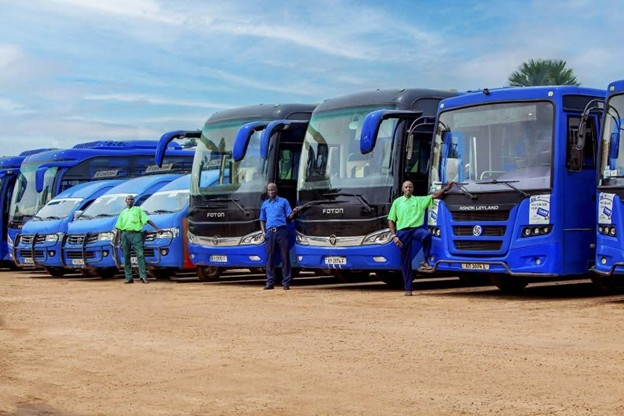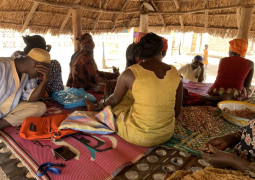
As the demands for efficiency soars across sectors, digitalisation becomes more paramount than ever perceived by anyone. Without a plan to adapt, sectors reluctant to leaving outdated approaches or that are still stuck to old ways are left far behind, later have to be struggling for years to catch up in a tremendously fast-paced world that does not wait for anyone.
The world is in its most advanced staged ever perceived in the history of humanity, and it is not lingering behind for anyone.
This is perhaps the realisation that struck the Gambia Transportation Service Company, the sole public transport service company in The Gambia, to move towards a more technological-inclined operation.
Established in 2013 as a private limited liability company, the semi-autonomous transport body is the sole public transport entity in The Gambia.
GTSC has the largest infrastructures in the transport sector, boasting of a fleet of 150 buses (29 to 56 passengers) and having depots across the length of The Gambia. It also employs a massive 700 staff.
From inception until recently, most of its services, although cheap and reliable, are not technologically backed but carried out manually, often wasting more time than necessary and hindering travel experience for commuters.
However, time is now money and wasting time is becoming more and more of a casualty for business entities. Queues for payment of fares, paper tickets and other means used from time immemorial are becoming more and more unsustainable. Now calls for smart operations to adapting to changing circumstances is the order of the day.
To achieve its vision - which is to "become the market leader in the road and river transportation industry of the West African sub-region by meeting the travel needs and requirements of passengers" within the Economic Community of West African States (ECOWAS) - it was imperative for GTSC to do sometime different.
This prompted a series of moves that proved crucial. In an event held at the GTSC head office in Kanifing on June 19, 2025, the company reached a strategic agreement with Wave, one of the leading, if not the leading, mobile money services in The Gambia to digitalise to improve services.
The initiative empowers passengers to purchase GTSC bus tickets using the Wave mobile money app.
As GTSC's traffic director Amadou Drammeh stated, it equally marked a major stride in the endeavour to march up with the digital evolution and change the whole narrative about public transport system in The Gambia.
The GTSC traffic division boss added: "The integration of digital fare collection is a game-changer for public transport in The Gambia. It brings improved efficiency, greater transparency, and enhanced convenience. Together with Wave, we are determined to deliver smarter, safer, and more reliable transport services to the Gambian people.”
GTSC's Deputy General Manager Ba Lamin Darboe expressed almost the same sentiment, highlighting how the move would transform public transport in The Gambia.
The Wave Gambia boss, Sainabou Sarr, describes it as a way of making transport smarter, faster and more accessible for everyone.
"Our digital payment system," she said, "would save time, eliminate cash-related friction, and bring us closer to a truly digital economy in The Gambia."
Meanwhile, an agreement with just one of the mobile money giants seemed insufficient. The GTSC is not adopting the new approach for its sake, as most institutions do over the years without any clear improvement in services. It continues to strive for real impact.
As such, it also penned down an agreement last week with another mobile money giant Yonna Wallet, a subsidiary of Yonna Microfinance, a household name in The Gambia microfinancial sector.
This seems to display a robust, management-coordinated drive for digitalisation, one with very grand vision.
"At GTSC, our motivation has always been to make transportation safer, smarter, and more convenient for our passengers. That is something that we look at, and we also recognise that today's customers rely on digital tools for their daily activities," the GTSC's Deputy General Manager Ba Lamin Darboe said in an exclusive interview at his office with The Point.
He underscored that the emergence of the Taamo Card, the partnership with Wave and Yonna are all natural steps in improving accessibility, efficiency, and customer experience, as customers could now purchase tickets directly through mobile money or use any form of payment to travel without hassle. "You don't need to have cash. We look at convenience in that you don't need to have cash to make payments always.”
Mr Darboe averred: "So the digital transformation journey cannot leave us behind as we are progressing. What it also does is enhance transparency, and, of course, reduce queues. So you don't need to see queues a lot, and, of course, it ensures a smoother travel experience across the country. So that is something that we look forward to. That is our motivation. Our motivation is to provide safer, smarter and more convenient transport for our passengers."
Quizzed over potential exclusion, a fear some customers raise, Mr Darboe was explicit in his clarification. He iterated: "We fully understand that some passengers prefer traditional methods, and of course we respect that. We have to respect it. At GTSC, we are not abandoning these systems. We are expanding the choices so that those that want to use different systems can.
"Therefore, customers can still buy tickets at our stations as before, and of course the digital options are just meant to make life a little bit easier for some passengers and safer, faster for some others as well. Now, we are also trying to ensure that our staff are well trained so that they can guide passengers through the new processes, especially first time buyers.
"But in GTSC, we are trying to look at inclusivity, which is very, very important. No customers should be left behind as we modernise our process. We don't want that. We look at inclusivity, and honestly if we leave customers behind, it will have an impact on us. So we don't want anyone to be left behind."
Meanwhile, the digital services are not uniform (in full scale) for the time being. Simple services like bus transport services, wherein prices for fares are the same, still sustain the traditional cash payment method. For instance, the University of The Gambia (UTG) student transportation service, which is D10 for all students, still operates cash payment for tickets.
The digital services are currently used by more complex transportation services, where prices for fares vary for different customers. This is the case for the meantime, implements its digitalisation vision in a step by step fashion that leads to a full scale digitisation of all services.
A commuter notes the speedy nature of service since the introduction of digital payment systems and e-ticketing in the company's system.
"Things have become much more efficient compared to before. There's little hassle, like we use to encounter," he adds. He expressed optimism over improved services.
Deputy General Manager Darboe weighs in once again, not only reassuring but re-emphasizing their vision.
"The digitalisation process, the digitalisation of our operations, coupled with our continued fleet expansion, and of course the diversification of our services, I think places GTSC among the leading and most innovative transport companies in the sub-region. We have other institutions that are in the sub-region. They are also trying to digitalise, but GTSC can well say that we are one of the most innovative transport companies in the sub-region. We are not left behind."
He reiterated that the GTSC is not just keeping pace but looking at the global trends to actively shape the future of public transport in The Gambia and of course within the sub-region.
"So of course with these initiatives, such as the digital ticket and of course other businesses that we want to come up with, we are demonstrating our commitment to national progress and of course the general competitiveness.
"That is very, very key. National progress is important. We want to place ourselves as one of those institutions that actually give back to the country and that actually promote growth, economic growth for that matter."
Read Other Articles In Feature





